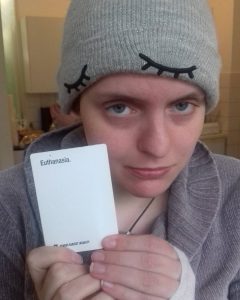The discussion surrounding assisted suicide is frequently debated in the media, with those suffering from terminal illness being at the centre of conversation. Now, with recent campaigns and case studies, the focus has switched to those suffering with mental health issues.
In January 2018, controversy arose when a 29-year-old Dutch woman Aurelia Brouwers, was allowed to end her life through assisted suicide. Debate didn’t arise because she was so young, but because Brouwers didn’t suffer from a terminal illness.

https://www.instagram.com/aureliabrouwers/
Brouwers had suffered with severe depression and anxiety for years. She had attempted suicide attempts in the past and had a history of self-harm. Four hours before her death, Brouwers posted on Facebook, “I’m getting ready for my trip now. Thank you so much for everything. I’m no longer available from now on.”
Cases like Brouwers’ are becoming more and more common.
Annual figures from RTL Nieuws, the regional monitoring committee of Dutch euthanasia legalisation, stated that there was an 8.1% increase in assisted deaths in 2017. Most of these physician-assisted deaths were authorised due to terminal illnesses such as cancer. But 83 out of the 6,600 individuals had severe mental illness.
Infamous assisted suicide organisations such as Dignitas in Switzerland, state that patients must be of ‘sound mind’ before being granted the right to end their life through a physician-assisted death.
Robert Preston, chairman of ‘Living and Dying Well’, a parliamentary organisation that discusses euthanasia and assisted suicide, disagrees that people with psychiatric illness should have the right to end their life via assisted suicide.
I don’t think they should be legalising assisted dying for people with severe mental health issues, I don’t think we should be legalising it for anybody.”
“Its difficult to see how you can make a decision of sound mind and have severe mental illness at the same time.”
Others have argued differently.
Adam Maier-Clayton from Windsor, Canada, suffered with severe mental health issues from a young age. Adam’s psychiatric wellbeing worsened in his early 20s, as he developed Somatic Symptom Disorder. Categorised as a mental illness, the disorder occurs when an individual focuses on physical symptoms such as pain or fatigue and develops extreme anxiety, which leads to an inability to function easily in day-to-day life.
“My son was highly ambitious, very intelligent and very physically fit,” his father, Graham Clayton said.
Throughout the four years of being diagnosed with Somatic Symptom Disorder, Adam tried around 20 different narcotic drugs, as well as treatments such as Cognitive Behavioural Therapy.
“Ketamine injections, marijuana oil treatment, he tried one psychological drug after the other and nothing worked. One or two things gave him some relief; in the beginning. Ultimately he ended up taking an addictive narcotic, hydromorphone, which he would take half a pill at a time.”
But nothing masked the pain he would feel daily.
Adam, believing he couldn’t overcome his illness, started to campaign against Canada’s parliamentary Bill C-14, fighting for change. The bill legalises both physician-administered euthanasia and physician-assisted suicide in Canada. To prevent the surge of ‘suicide tourism’ that has reached Switzerland because of organisations like ‘Dignitas’ and ‘Exit’, it is only available to Canadian residents. However, that’s not where the issues arose for Adam. Assisted suicide is categorically not available to those suffering with mental illness, or any curable condition.
Despite Adam’s relentless campaigning, his fight was not won.
“Adam left in the middle of the night,” said Graham Clayton.
“He drove to a nearby hotel, had something for his breakfast, played some of his favourite music and watched television for a few minutes took Nembutal, the life ending drug.”
“He was dead within an hour.”
Adam’s suicide sparked significant discussion about the campaign he was fighting for. Most notably amongst those working in the mental health sector.
Brogan Algar, a psychologist working in Acute Mental Health in adults, discussed her opinions on this controversial debate.
“I view mental health as a continuum and believe that people can recover or improve, whether it be slightly or greatly with professional help.”
“It worries me that someone would decide to end their life in the deepest, darkest part of their illness, when they could be brought out of that depressive phase with time, medication and talking therapies instead.
“Some physical illnesses are terminal and therefore I can see why someone would want euthanasia, but mental health isn’t a terminal illness, its something that people can recover from.”
 In most organisations, it is important to note that assisted suicide is seen as a last resort for an individual.
In most organisations, it is important to note that assisted suicide is seen as a last resort for an individual.
Melissa Mountford, a psychologist working within the mental health sector explains what steps mental health professionals take, when an individual wanting to end their life approaches them.
“A multidisciplinary approach is taken towards any individual who is actively suicidal. This means that a whole team of people from different professions will be involved to support said individual.”
“Psychiatrists will also be involved to review medication and prescribe or change doses. The individual will receive their own personal care co-ordinator, typically a psychiatric nurse or social worker, to enforce a carefully thought out care plan and monitor their mental state.”
“In severe cases, an actively suicidal person would be sectioned and monitored under inpatient care.”
An issue within the mental health sector has now appeared. With cases like Aurelia Brouwers becoming more common, there’s an underlying worry that once assisted suicide is made available to people with mental health problems, more and more people are likely to be drawn to it, before all their treatment options have been exhausted.
As of December 2018, euthanasia is legal in the Netherlands, Belgium, Columbia, Luxembourg and Canada. Assisted suicide is legal in Switzerland, Germany, the Netherlands and in the US states of Washington, Oregon, Colorado, Hawaii, Vermont, Montana, Washington DC, and California.

If you are struggling to cope, you can call Samaritans for free on 116 123 (UK and Ireland).
To follow my journey making this feature, take a look at the links below.


